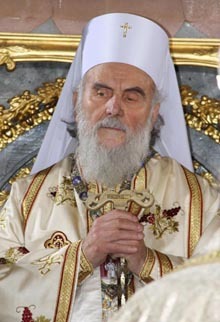
Serbian Patriarchal Appeal to Turkey Over Hagia Sophia
Church of Serbia – 14/7/2020
Appeal to Turkey
There is hardly anyone in the civilised world not knowing of Hagia Sophia, a magnificent and unique church, at a time the most important church of the entire Christian world, both in the East and in the West. It is also generally known that Hagia Sophia was the Christian church for more than nine centuries and the mosque for more than five centuries. Due to its architecture and fresco painting, it is one of the most important cultural monuments and monuments of mankind’s spiritual heritage, protected by UNESCO. If an unknown Muslim poet could write on the Church of the Mother of God of Ljeviša in Prizren (Serbia) that pupil of his eye is the nest to her beauty, whose eye and what kind of sophisticated artistic feeling could express the unparalleled beauty of Hagia Sophia?
However, its importance is not just in its artistic and cultural value. It is, first of all, for all the Christians, Orthodox and the other ones, an important shrine, witness to and source of authentic spirituality. Surely, it was and has been the place of centuries-long prayerful life and inspiration to Muslim faithful as well. Thus it is no wonder that Kemal Pasha Atatürk, the founder of modern Turkey and witness to the long historical coexistence of Muslims and Christians, found a sensible compromising solution – certainly having in mind the stated facts – to turn this church into the museum, open for everybody and everyone, whereby none of the faithful, either Christians or Muslims, was deprived of the possibility to pray to the Lord silently, in the spirit of his personal faith and tradition.
Consequently, we consider the cancellation of Atatürk’s decision and unilateral reconverting of Hagia Sophia into a mosque to be not only a historical injustice but also a rush and unnecessary political movement, detrimental both to the international image of Turkey in the world and to the relations and trust between Christians and Muslims in the world. We hope it is clear to everyone that the alternative for the future is not an artificially induced confrontation of two greatest world religions, Christianity and Islam, but peace amongst their believers, or better say: not only peace or just tolerance but also mutual respect, as well as dialogue and cooperation in everything that serves general benefit of people and peoples, without jeopardising anybody’s religious and cultural identity.
In our opinion, the only just solution, if Kemal Pasha’s decision is to be altered, is to keep the status of a museum, and to give permission for worship not only to the Muslims but to the Christians too. The church is spacious enough to provide space for everybody to worship without hindrance. Such a solution would not be a precedent in the modern world. Not only in Jerusalem or at Sinai – and these are the holy places for the believers of both religions – but elsewhere as well, even in Serbia and in some other regions in which the Serbian people live, both a church and a mosque often stand one by the other, testifying of historical symbiosis, tolerance and trust between the neighbours.
After the appeals of the primates of the Christian Churches (Patriarch Kirill of Moscow and All Russia, Pope Francis of the Roman Catholic Church and others), state officials of Russia, USA and other states, and of UNESCO, herewith we are addressing, on behalf of the Serbian Orthodox Church, the appeal to the President of the Republic of Turkey Recep Tayyip Erdoğan, to refrain from his intention and to retain status quo regarding Hagia Sophia’s status. It is not yet late for that. Such an activity would be an honourable act on his behalf, and it would be of great comfort and satisfaction to the Ecumenical Patriarch Bartholomew, his Church and the Roman community in Turkey who all are in pain and grief because of the decision. And finally, it would bring approval, trust and congratulations to modern Turkey from the entire cultural public all around the globe.
Serbian Patriarch Irinej,
Head of the Holy Synod of Bishops

